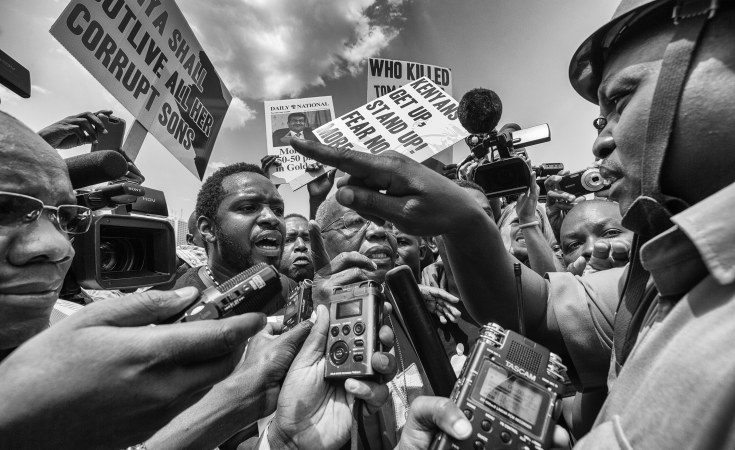Only about half of citizens say the country's media is "somewhat" or "completely" free.
Key findings
- A large majority (71%) of Ethiopians "agree" or "strongly agree" that the media should "constantly investigate and report on government mistakes and corruption."
- About six in 10 citizens (59%) endorse the principle that the media "should have the right to publish any views and ideas without government control."
- A slim majority (51%) of respondents assess their country's media as "somewhat free" or "completely free," while 44% consider the media "not very" or "not at all" free.
- Close to two-thirds (64%) of adults own a mobile phone, 33% a radio, 29% a television set, and 5% a computer. o Only 22% own a mobile phone with Internet connectivity.
- Radio is Ethiopia's most popular news source: 42% of citizens say they tune in "every day"or "a few times a week." More than a third (35%) say they regularly get news from television, while about two in 10 are regular consumers of news from social media (18%) and the Internet (17%).
Ethiopia's media enjoyed unprecedented freedoms soon after Prime Minister Abiy Ahmed took office in April 2018. Several jailed journalists were freed, previously banned media outlets were allowed to operate, and the media landscape bloomed with a proliferation of new outlets (Amnesty International, 2019; Mumo, 2019).
However, media freedoms appear to be in trouble. According to Reporters Without Borders (2024), "most of the recent press freedom gains have been lost since Ethiopia became embroiled in ethnic conflicts and civil war," and fear of reprisals persists among journalists even after the November 2022 peace accord. Ethiopia is ranked 130th out of 180 countries in the Reporters Without Borders 2023 World Press Freedom Index, down from 99th before the all out war in the Tigray region in 2020.
Media freedom and independence were dealt a further blow in 2021 when Ethiopia's House of Peoples' Representatives appointed politicians to the board of the Ethiopian Media Authority (EMA). According to the Media Proclamation, a statute establishing the EMA, members are supposed to be nominated in an open and transparent process free from government manipulation and interference. Further, the proclamation prohibits members and employees of any political party from serving on the EMA board of directors (Law Ethiopia, 2021). Since then, media houses and individual journalists - both local and international - have faced threats should they report on government security operations or deviate from the government's narrative (Issa, 2024).
Many international journalists have been expelled from Ethiopia, while others have been detained for days for publishing news stories that go against the government's wishes (Ethiopia Human Rights Commission, 2022; Le Monde, 2024). In 2022, 111 journalists were arrested and charged with inciting violence (Freedom House, 2023). As a result, many journalists and media outlets engage in self-censorship (Muyiwa, 2024).
Even so, the media landscape is freer and more diverse now than under the previous government (Reporters Without Borders, 2024). Until April 2018, more than 200 media outlets had been banned. These media outlets are now in operation, albeit under erratic conditions. The pre-reform period of media in Ethiopia was marked by disrespect for media laws, which limited journalists' freedom of expression (Tufa & Dejene, 2023).
Findings from a recent Afrobarometer survey reveal that solid majorities of Ethiopians want a news media that is free of government interference and that helps hold the government accountable. A slim majority perceive the country's media as free.
A majority of Ethiopians own mobile phones, but few have data connectivity via their phones. The primary sources of regular news for Ethiopians are radio and television.
Mulu Teka Mulu Teka is the national investigator for Ethiopia.
Daniel Iberi Communications coordinator for East Africa


